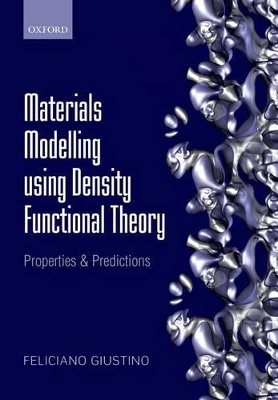
Materials Modelling using Density Functional Theory
Oxford University Press (Verlag)
978-0-19-966244-9 (ISBN)
This book is an introduction to the quantum theory of materials and first-principles computational materials modelling. It explains how to use density functional theory as a practical tool for calculating the properties of materials without using any empirical parameters. The structural, mechanical, optical, electrical, and magnetic properties of materials are described within a single unified conceptual framework, rooted in the Schrödinger equation of quantum mechanics, and powered by density functional theory.
This book is intended for senior undergraduate and first-year graduate students in materials science, physics, chemistry, and engineering who are approaching for the first time the study of materials at the atomic scale. The inspiring principle of the book is borrowed from one of the slogans of the Perl programming language, 'Easy things should be easy and hard things should be possible'. Following this philosophy, emphasis is placed on the unifying concepts, and on the frequent use of simple heuristic arguments to build on one's own intuition. The presentation style is somewhat cross disciplinary; an attempt is made to seamlessly combine materials science, quantum mechanics, electrodynamics, and numerical analysis, without using a compartmentalized approach. Each chapter is accompanied by an extensive set of references to the original scientific literature and by exercises where all key steps and final results are indicated in order to facilitate learning. This book can be used either as a complement to the quantum theory of materials, or as a primer in modern techniques of computational materials modelling using density functional theory.
Feliciano Giustino is an Associate Professor of Materials Modelling in the Department of Materials at the University of Oxford, the co-Director of the Materials Modelling Laboratory, and Associate Editor of the European Physical Journal B. He holds an MSc in Nuclear Engineering from the Politecnico di Torino, a PhD in Physics from the Ecole Polytechnique Fédérale de Lausanne, and before joining the Department of Materials at Oxford he was a researcher in the Department of Physics at the University of California at Berkeley. His research team specializes in the computational modelling of nanomaterials and the development of methods for electronic structure calculations. He has been recipient of the European Research Council Starting Grant and of the Leverhulme Research Leadership Award. Besides his research work, he teaches two undergraduate courses on the quantum theory of materials at the University of Oxford.
1. Computational materials modelling from first principles ; 2. Many-body Schrodinger equation ; 3. Density-functional theory ; 4. Equilibrium structures of materials: fundamentals ; 5. Equilobrium structures of materials: calculation vs. experiment ; 6. Elastic properties of materials ; 7. Vibrations of molecules and solids ; 8. Phonons, vibrational spectroscopy, and thermodynamics ; 9. Band structures and photoelectron spectroscopy ; 10. Dielectric function and optical spectra ; 11. Density-functional theory and magnetic materials ; Appendix A: Derivation of the Hartree-Fock equations ; Appendix B: Derivation of the Kohn-Sham equations ; Appendix C: Numerical solution of the Kohn-Sham equations ; Appendix D: Reciprocal lattice and Brillouin zone ; Appendix E: Pseudopotentials
| Erscheint lt. Verlag | 15.5.2014 |
|---|---|
| Zusatzinfo | 24 b/w and 42 colour illustrations |
| Verlagsort | Oxford |
| Sprache | englisch |
| Maße | 175 x 246 mm |
| Gewicht | 589 g |
| Themenwelt | Mathematik / Informatik ► Informatik ► Theorie / Studium |
| Mathematik / Informatik ► Mathematik ► Angewandte Mathematik | |
| Naturwissenschaften ► Physik / Astronomie ► Festkörperphysik | |
| Naturwissenschaften ► Physik / Astronomie ► Quantenphysik | |
| Technik ► Maschinenbau | |
| ISBN-10 | 0-19-966244-4 / 0199662444 |
| ISBN-13 | 978-0-19-966244-9 / 9780199662449 |
| Zustand | Neuware |
| Haben Sie eine Frage zum Produkt? |
aus dem Bereich


